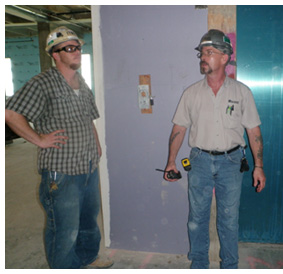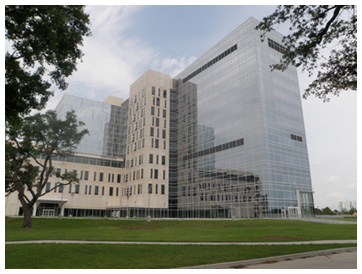 Saied Alavi, operations manager at Marek Brothers Systems Houston, recently visited Guadalupe “Lupe” Ramos at a job site where Marek is installing drywall in medical office space for Baylor Clinic & Hospital. Lupe came through Marek’s workforce development program, and is currently an employee with the rank of “Helper” on the Marek Career Path. In the video below, Saied talks with Lupe and his Marek “Coach”, Kevin Mathews, about how Lupe came to work for Marek and the difference his job has made in his life.
Saied Alavi, operations manager at Marek Brothers Systems Houston, recently visited Guadalupe “Lupe” Ramos at a job site where Marek is installing drywall in medical office space for Baylor Clinic & Hospital. Lupe came through Marek’s workforce development program, and is currently an employee with the rank of “Helper” on the Marek Career Path. In the video below, Saied talks with Lupe and his Marek “Coach”, Kevin Mathews, about how Lupe came to work for Marek and the difference his job has made in his life.
Lupe was familiar with the construction industry growing up because some of his uncles install ceilings for companies in California and Texas. A few weeks after graduating high school, he filled out an application at Marek in Houston after hearing about the company from one of his uncles. He was initially planning to apply to be an acoustical ceiling trainee, but while he was at the office applying for work, someone pointed out Buddy Britt, training coordinator at Marek, and suggested that Lupe talk to him. After talking with Buddy, Lupe signed up for the training program in the drywall department.
When asked what made him interested in construction, Lupe answered:
“You look at things and you wonder, ‘how did they build that?’ Little simple things that you wonder about.”
As previously reported on Construction Citizen, Marek uses workforce “Coaches”, where every worker that comes into the company is partnered with an experienced journeyman who has been trained with coaching skills in the job the  new worker is assigned to, and in this way the new worker learns the Marek procedures and standards. Kevin Mathews, Lupe’s Marek “Coach, explained how he teaches Marek “Helpers” such as Lupe, who come to work not knowing anything about how to install drywall. They are guided by their “Coaches” step by step throughout every day, working side by side.
new worker is assigned to, and in this way the new worker learns the Marek procedures and standards. Kevin Mathews, Lupe’s Marek “Coach, explained how he teaches Marek “Helpers” such as Lupe, who come to work not knowing anything about how to install drywall. They are guided by their “Coaches” step by step throughout every day, working side by side.
Saied also had Kevin and Lupe talk about how safety is addressed and why it is so important. Lupe definitely understands the concept. He said:
“You want to keep your workers. If you’re not safe, there will be casualties which eventually cause workers to be out of work. A lot of contractors hire companies due to the fact that their safety is high. They don’t have a lot of accidents – a lot of casualties. Because of course if you compare two companies – one company’s safety is poor but you look at the other company and their safety is perfect, or not perfect but higher than the other one – of course they are going to hire the one with the best safety because they don’t want any casualties on the job.”
However, the heart of the interview came earlier when Saied recalled a conversation he and Lupe had a few weeks ago. Saied had asked Lupe, considered an excellent employee, if he had any friends that might want to come to work at Marek. Lupe responded that he had no friends. Saied asked him to explain, and Lupe’s reply was staggering:
“At this moment you cannot really even call them friends. Most of my friends, you look back, and at this moment – they’re in jail.”
After high school, the friends Lupe used to hang out with kept “going out and breaking the law”. Lupe decided not to follow them, and chose a different path, landing the job at Marek. Saied asked whether Lupe thought that having a chance to take some kind of vocational training during high school might have encouraged some of those friends to act differently and choose to find employment rather than crime. Lupe answered, “Yeah, definitely.”
Saied went on to say that with no structured vocational training in most high schools, young people have little chance at the better-paying construction work when they graduate because they don’t have any trade skills. Many construction companies are not willing to invest in training, and would rather hire workers which they pay as piece workers instead of by hourly wage. These companies often misclassify those employees as independent subcontractors. Without any skills or job opportunities, it is not surprising to Saied that many young people end up on the streets and eventually in jails, but it is a useless and wasteful tragedy.
Watch excerpts of the interview in the following video.

The Choice Between Job or Jail [VIDEO]
by Elizabeth McPherson | April 18, 2012



Add new comment